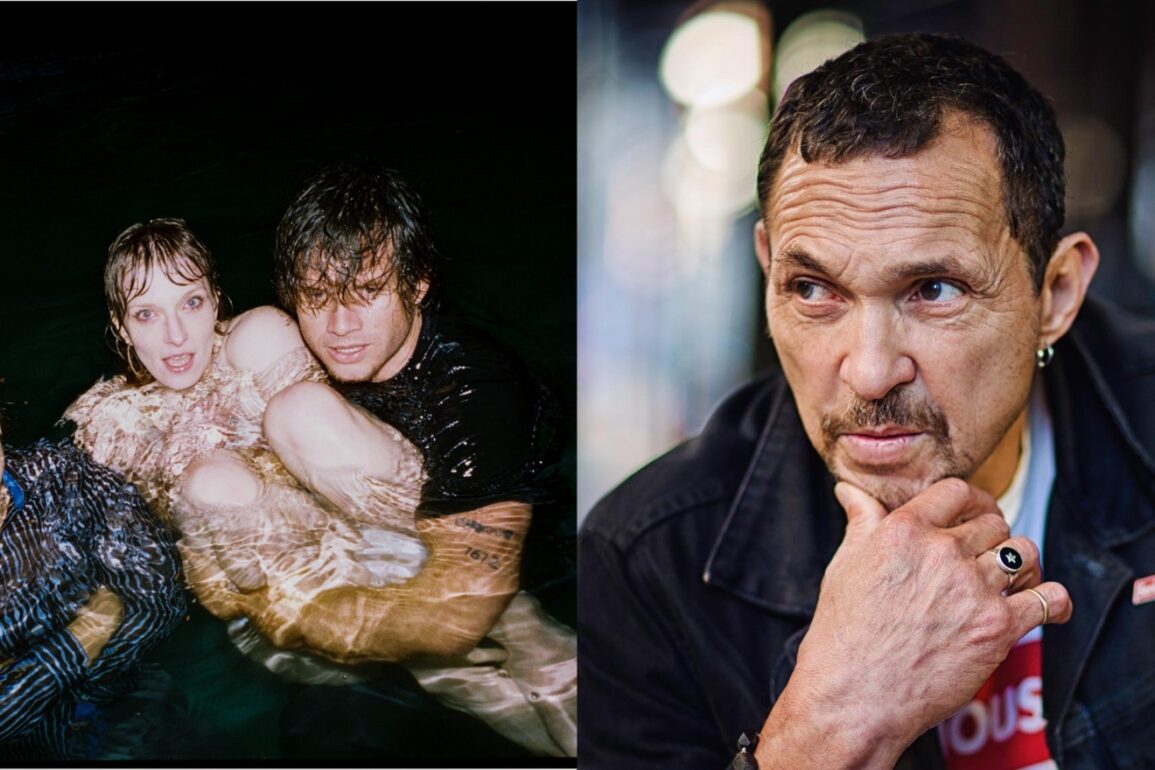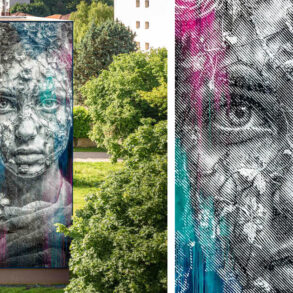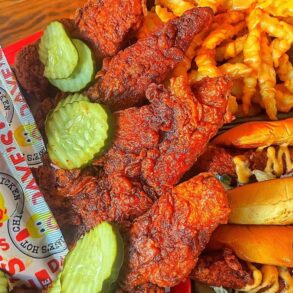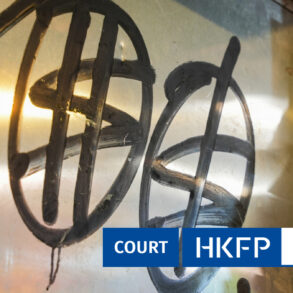Al Diaz is a legendary graffiti artist (who co-created SAMO© with Basquiat) and musician from NYC; Jack Summers is the singer and guitarist for the Naarm/Melbourne-based punk band CLAMM, and a painter. CLAMM’s new record, Serious Acts, just came out last month on Meat Machine, so to celebrate, Al and Jack got on a Zoom call to chat about their multi-media creative practices, the importance of anger in making political art, and more.
— Annie Fell, Editor-in-chief, Talkhouse Music
Al Diaz: So, tell me, what are you working on?
Jack Summers: I’m playing in… I guess it’s a noisy punk band. We’re from Naarm, from Melbourne. But I’m in Manchester right now. We’ve got a new album out.
Al: Excellent!
Jack: We’re touring it over here in the UK and Europe. So I’m in Manchester right now, sitting in this big house. This lovely lady called Bernie has heaps of bands through — everyone’s come through here, there’s posters of every band you could ever imagine. She’s got this really big, beautiful backyard.
Al: And she just hosts bands out of the kindness of her heart and love of music?
Jack: Yeah, that is exactly what she does.
Al: That’s pretty cool.
Jack: It’s so cool. We’re not a big band, so on the road, it’s hard. And so to come here, it’s like we get to sit and it feels like home.
Al: So what’s going on as far as the music scene in Manchester now?
Jack: Well, it’s funny. We’ve been to Manchester a few times, and we’ve only played this one venue. So my knowledge of Manchester is Bernie’s house and this one venue. [Laughs.]
Al: I know Manchester’s got a really rich history of real diverse groups.
Jack: Totally. I know that there’s a lot of working class history out here as well. It’s interesting, when we come to the UK, there’s always strikes happening. I think people are unsettled and there’s this urge to resist.
Al: It’s that working class thing. It’s admirable, that kind of resistance and resilience. I think Americans need a little more of that right now, that spirit and that tough hide.
Jack: Do you feel like that’s happening for you right now?
Al: I mean, the fact that we are where we are at is because that was allowed to happen. Perhaps there’s a little more resistance now, because the fact is that the administration in power here has become blatantly abusive. People, at a certain point, are just going to not tolerate that abuse of power. So I think now it’s becoming a little more visible that there’s some resistance, but it’s still not strong enough.
Jack: I couldn’t agree more. In Australia, we’re so isolated and so far away from everything that sometimes I feel like Australia is kind of the country town of the world. We’re just this giant island. Most of my travel has been through music, and coming over here, I’ve been like, Wow, we’re really complacent in Australia. We just let the government get away with anything, and it’s like we’ve got this get-on-with-it kind of attitude. But I guess I look at the States now and I’m like, How could people be getting on with what’s happening there?
Al: I have very little tolerance for the fact that it’s become this, but one person can’t do a lot. I speak out against the government in my art and stuff like that, but that’s just not nearly enough.
Jack: Yeah, I was looking at your work and I actually thought about that. Has it always been [political]? Especially lately, your latest work seems to be.
Al: It’s because of the fact that it’s gotten so out of control here. It’s just insane.
Jack: Like what you just said, that one person’s not enough — sometimes I feel like I’m trying to do something good, but what can you do? And then I was thinking, Well, do we make these things for us, to make us as the creator to feel better? What do you think? Are you making stuff because you want people to wake up or to change?
Al: Yeah, it’s that. If you have a group of 25 people and you can get a message to a third of those people that may, more or less, agree with you, that’s to me a success. It’s not that it’s for me. It’s that I have to do it. It does fulfill a need or a desire to express that, but it’s not, per se, for myself because I want to see it or I want to own it or anything. I mean, maybe when I was younger it was different. Because we do evolve like that; we become a little less self-absorbed. For me, it’s about sharing it. Somebody told me once, “As artists, we want people to get it, to understand it. And that’s the success, in conveying a message or an idea.”
Jack: I totally agree. This is our third album, and I have been reflecting on how the themes — which are about this frustration and not wanting to accept this system, this massive power imbalance and wealth inequality — it’s the same themes as the other ones. And I was kind of going, Oh, you’re just doing the same thing… But then I was like, You know what? I don’t think I could do anything else with the way that the world is right now, and the direction that it seems to be going in terms of fascism and separation and just this bleak, mass information world—
Al: And disinformation.
Jack: Manipulation.
Al: All the above. It’s like Brave New World and 1984 and all those books predicted. All those things have really come to pass, the systematic disinformation and the way language is manipulated. It’s scary.
Jack: I remember when that Black Mirror show came out—
Al: I love Black Mirror.
Jack: I was like, I can’t watch this because it’s too real.
Al: It’s frightening, yeah.
Jack: A lot of it appears to be happening.
Al: The technology stuff, it’s real creepy.
Jack: Was there a shift for you when it came to [working in visual art and then music]?
Al: I was making art as a kid, and it was never not there, as far as I know. I took it seriously. Me and one of my schoolmates were the two real artistically talented kids, so they nourished that in school to some degree. We would do the bulletin boards or whatever. So I felt it was a special thing. And at home it was, it was nourished. Not intensely, but no one tried to stop me from making art. It wasn’t discouraged.
Jack: That’s pretty important.
Al: Yeah, it is important, especially at home. So it was always high in my value system. And, of course, during different periods of my life, with whatever was going on in my life, I did more or less, but I never stopped creating. At one point, when I was around 19 or 20, I was still hanging out with Basquiat and a couple of other artists friends, but I had probably run out of ideas, or I was just dry as far as visual art. I remember I found this big car spring, a coil from a suspension system, maybe a truck. It was huge. I brought it up and I put it inside a box with a perfect circle in it, so you could look inside and see. And I was so disappointed with it. [Laughs.] It was during the time when there was a lot of minimalism in New York, and I worked next to the Donald Judd [Foundation]. I was influenced by what I was seeing, but it was the older folks that were making it, so it was just this empty fucking thing. I was just like, Oh, this is terrible. I felt like I had run out of steam when it came to visual art.
Jack: [Laughs.] You just put the spring in the box?
Al: That was the extent of it! [Laughs.] And then I decided that I wanted to play music, and I focused for the next 10 years on playing. I started by making percussion instruments. I took some lessons on timbales during that period, and had congas and stuff. I was working in a wood shop making cabinets, and I started to make my own vibes and marimba type instruments. So I did that for a long time. I mean, during the ‘80s in New York, everybody was experimenting heavily with many different mediums, and I was part of that era. So it was great because I was physically making an object and playing the music, so it was very fulfilling. As opposed to putting a spring in a box.
Jack: [Laughs.] I paint as well, and I was just thinking about how we both have the visual side and the music side. I was curious about how those two things interact for you.
Al: Maybe the fact that I work with constant soundtrack — I don’t work in silence, I work with music on. I guess that kind of anchors it to some degree. I’ve actually been inspired by songs and lyrics to make certain pieces. That’s the real blatant connection. But I guess the other thing would be that when I was playing music, I was very fervent about it. I was very gung ho and all in. I worked as a carpenter during the day for 30-something years, but for about 10 years of that of that time, a lot of my time in the evening was dedicated to going into the studio or to playing gigs with a variety of different people. I played with Liquid Liquid — I don’t know if you know any of these bands.
Jack: Yeah, yeah.
Al: A band called Konk, which was a very popular East Village funk-with-a-Latin-edge kind of band. I played with a pretty successful experimental musician named Elliott Sharp, and we had a band called ISM in the ‘80s. And then I did a lot of recording with a group of friends, and we called ourselves Chunk of Sound, but it never really went anywhere. Some of the tunes were really strong, but everybody got drugged out during that time, and it kind of fell to shit because we couldn’t follow through. But the music was good.
But the point was that I worked hard. So that same energy, that same focus, that same wanting to succeed — that drive is never different. It’s whatever you’re doing, if you’re building houses or making paintings, whatever, you do it with the same energy.
Jack: Yeah. So you feel that in your art making practice?
Al: Yeah. I still have that drive. It’s a work ethic, really. I have no time to be bullshitting. I was for the longest time a very undisciplined person, and I had to learn that discipline. And thank god for it, because it pays off. If you work, work, work, it pays off. It just does.
Jack: It’s nice to hear that you feel like that.
Al: I mean, I can make a living. I’m not rich or anything, but I can make a living, and it’s because I hustle.
Jack: Yeah. But even just to be satisfied with your own practice — I mean, I know that you’re saying that this work ethic means that you’re still driven, so “satisfaction” maybe isn’t the right word…
Al: The fact is, in my drinking and drugging days, I was not happy. Obviously. You’re trying to fill a hole that’s unfillable… But you realize that life is short, man, and you don’t have all that time to just be throwing your life away. Especially when you get a little older and you lose a lot of friends and people are not around anymore, you start to realize, Hey, this is a finite thing. This is not forever. So if you feel like you have something to offer the world and you want them to see it, you need to get busy and do it.
Jack: Yeah. That’s giving me a bit of drive that I think I need.
Al: [Laughs.] You described the band as punk — that’s a good energy for sending out messages nowadays.
Jack: Yeah. I think I’m generally pretty relaxed as a person, but there is a part of me that is not relaxed. I think there’s a part of everyone that isn’t relaxed, and I think there’s a part of everyone that shouldn’t be relaxed about the way things are in a general sense. So it’s become a real important cathartic experience for me to have. And I think for other people as well, to be able to have a space where there can be a healthy amount of anger, but also a sense of community and just being able to enjoy music.
Al: What’s the group like? What instruments do you guys play?
Jack: We’re a three piece, so it’s bass, guitar, drums. Me and the drummer, when we were in our early 20s, we were playing in all these terrible psych bands with terrible names and terrible lyrics and terrible chords — everything terrible. [Laughs.] I guess I had a lot of anger when I was a kid, and I didn’t really let it out. I was a single child, and it was just me and my mum, and I think I learned pretty well how to put a smile on.
Al: I think using that anger, or focusing it without it becoming uncontrolled rage, is a really good tool to utilize in sending a message or trying to make people think. I think that anger is important.
Jack: I think so, yeah. I’ve had to learn that. And I think that anger is probably important right now in a collective sense.
Al: Especially now. We have to resist and not accept the conditions that we’re headed toward, especially in this country. It’s out of control, and it’s just not acceptable. We’re in a world where we’re mind controlled and brainwashed into accepting the unacceptable, and there has to be a an end to that. And you’re in a position, if you’re reaching young people, to send that message.
Jack: Well, I hope so. Thank you for your words. I’m feeling a bit more driven and inspired. I felt a bit flat before this call. [Laughs.]
Al: Excellent. I’m pleased to finally have this conversation and to meet you.
Jack: It was really nice to meet you!
(Photo Credit: left, Oscar O’Shea; right, Joseph Dalton)

This post was originally published on this site be sure to check out more of their content.









